Cape Town, South Africa – The first sign that Anwar Abdullatief is not an average chef is his choice of headwear. Despite the whimsical and sophisticated nature of his cooking, he and his team do not wear puffy white chef hats. Granted, many modern chefs favour grittier skull caps or bandanas. But Abdullatief does it his own way: Everyone in his kitchen wears a demure tartan flat cap and a stonewashed blue apron.
Neatly stacked stainless-steel shelves reach almost to the ceiling of the renovated warehouse space. Extra chairs are stacked in the parking garage which is visible through the open back door. The team of 11 works silently, methodically, as they assemble the artful creations that are the product of Abdullatief’s imagination. On one counter, an assistant arranges leaves and flowers on the elaborate labyrinthine platter in which mature cheddar cookies with smoked hake and prawn brandade are nestled.
At the stove, Abdullatief is deep-frying the battered dune spinach – an ingredient he first encountered on surfing trips up South Africa’s desolate west coast – that will adorn “The Bass”, this week’s fish course.
![The Bass [Courtesy of The Happy Uncles]](https://www.aljazeera.com/wp-content/uploads/2024/04/happyuncles-1714317803.jpg?resize=770%2C513)
If there’s one thing Abdullatief has gleaned from two decades working in some of South Africa’s finest kitchens, it is this: “Chefs love alcohol, bacon and Parma ham.” It is normal for chefs to try each other’s sauces but, as a Muslim who abstains from all three, Abdullatief soon realised it was safer to just say no.
That changed when he was made head chef: “Whenever I was put in charge of things, I would surreptitiously make the menu halal. No pork in the stock, no alcohol in the jus,” he says with a laugh. “My bosses never complained and neither did the diners. The food tasted good – why would they?”
Fast forward a few years and the 40-year-old is now the owner of The Happy Uncles, South Africa’s first fine dining halal restaurant, and Barakat, a popular contemporary Cape Malay eatery in Cape Town’s new Time Out Market. Last year, he scooped the Rising Star prize at South Africa’s premier restaurant awards.
It is a significant accomplishment considering he had finished with restaurants two years ago.
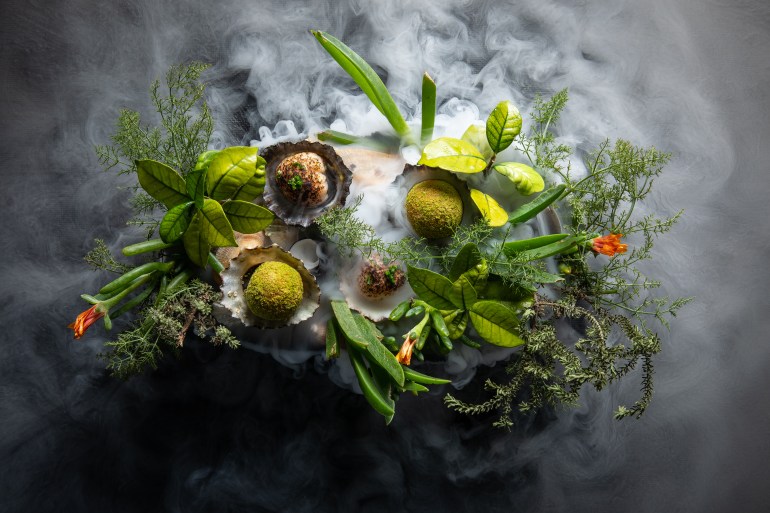
What’s in a name?
“I didn’t plan any of this,” he explains: “The Happy Uncles is not a good name for a restaurant. The space is surrounded by scrap yards. None of this was meant to happen … life just pushed me in that direction.”
After exiting his previous business, a café in the farming town of Paarl called My Cross Aunt (a playful take on the French word croissant), in 2021, Abdullatief turned his focus to private cheffing. As his client list grew, he realised he needed a name for his business and a place to store his equipment.
He did not give either much thought. “What’s the opposite of a cross aunt?” he asks, rhetorically. The Happy Uncles signified a fresh start: “I was moving back home, getting married, I could surf all the spots again. But it was never meant to be the name of a restaurant.”
The space, in a renovated warehouse surrounded by panel beaters and shipping containers, was also not meant to be a dining establishment. But when he was asked to put on a birthday party for a good friend’s wife, he was forced to find some tables and chairs.
“We did a six-course menu for the family,” he recalls. “After the dinner, they started posting on social media, going on about this halal fine-dining experience and hassling me to do it for more people… Every time I did a dinner, the people would tell me to make it a restaurant. But I didn’t want to go back to that.”

Then, he says, strangers started calling: “Everyone was saying ‘You’re the first halal fine-dining restaurant in the country.’ But we weren’t even a restaurant.”
Eventually, he relented. “We started off once a month. Then every second week. Then once a week …” Fast forward 18 months and the restaurant is now open five days a week and has won multiple awards, including for the best halal restaurant in Cape Town in 2023.
While Abdullatief seems surprised at his rapid rise, Jermaine Esau, a fellow chef who has known him for a decade and a half, is not: “None of it was ever intentional but there was a need for it,” he says. “The Muslim community in Cape Town is huge. They wouldn’t go to places where there’s wine around. Muslim fine dining makes perfect sense. But Anwar’s such a good chef that he gets supported by people from all over.”
Abdullatief estimates that only 50 percent of his clientele is Muslim.
The space – all exposed bricks and original artwork – is far more refined than Abdullatief lets on. The pictures he has chosen to display reflect his personality. One wall features a zany painting of a woman in pointy sunglasses and a Rasta hat with feathers dangling from her hair; another is bedecked with gilt-framed prints of Arabic calligraphy.
On a glossy table to the side, a dozen glass teapots, each containing a different shade of amber liquid, stay warm above tealight candles. This curated tea menu changes as often as the food menu does.
Next to the tea table sits a somewhat hidden rack containing bottles of non-alcoholic champagne.
Every dish on the eight-course menu Al Jazeera tried was remarkable, but there were two standouts. “Amagwinya” is elevated township street food: a deep-fried dough ball stuffed with tender karoo lamb and accompanied by “smoked tarragon buttercream, salsa verde, butter pips [the seeds of an indigenous melon favoured by the Khoisan people] and truffle aioli.”
The other winner: a palate-cleansing elderflower and apple sorbet, made theatrically at the table with more than a little help from a flask of liquid nitrogen.
Do not expect to taste these dishes in weeks or months to come, however. Abdullatief changes his menu whenever the whim takes him.
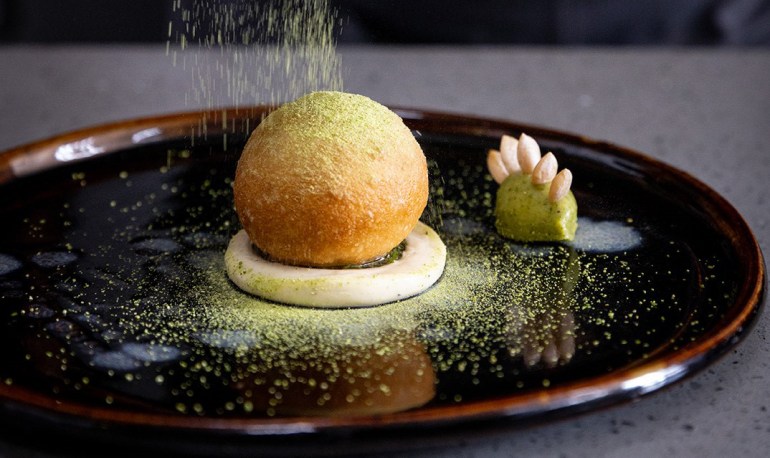
Back to the start
Abdullatief grew up in the Cape Town suburb of Zeekoevlei, named after the hippos that still live in the nearby wetland. Although most of his schooling took place after apartheid had ended, because of South Africa’s complicated past, he went to a school with no white students.
“It was the first high school of colour to offer cooking as a subject,” recalls Abdullatief, who was part of that first class. “I loved cheffing, but I didn’t get great marks. I was always on my own mission, making my own dishes. Everyone else was conforming.”
And not just in the kitchen. “I was into heavy metal and drum ’n bass. I always had my skateboard with me. I was a surfer,” he says. “It’s not that I didn’t have friends. But I was always a bit different.”
Abdullatief, who remains a keen surfer, expanded his culinary horizons on surfing trips: “We were camping, cooking on fires, foraging for mussels, eating dune spinach… I took the cooking techniques I’d learned in chef class and ran with it.”
Abdullatief did not understand it at the time, but his first and most important culinary classroom was his Cape Malay upbringing. The term for Cape Town’s Muslim community traces its origins back to slaves brought to South Africa from the East (mainly Indonesia) from the 1650s onwards. “Cape Malay people grow up with flavours: cinnamon, cardamom, star anise, coriander seeds,” he says. “As a youngster, you don’t think about it … Your mom just wants to give you food but you’re shy to open your lunchbox because it will smell funny.”
Only now that Abdullatief has grown up does he realise how lucky he was: “I had a wealth of food experience under my belt without even knowing it. I grew up eating good-quality tasty meals three times a day. A huge variety of different dishes cooked by my mom and my gran.”
Some of that knowledge lay dormant – but not forgotten – for decades.
After school, and a tourism diploma, Abdullatief got a job as a hotel chef. It was during this time that he became “obsessed” with the brain, he recalls. “I’d be sitting on a train analysing people: Why’s this person huddled in a corner? Why’s that one holding the bar?”
Not leaving that itch unscratched, he enrolled for a degree in psychology. While his subsequent career success stopped him from finishing the degree (with just two modules remaining) he is glad he did it: “To be a good chef, you need to use psychology all day, every day.”
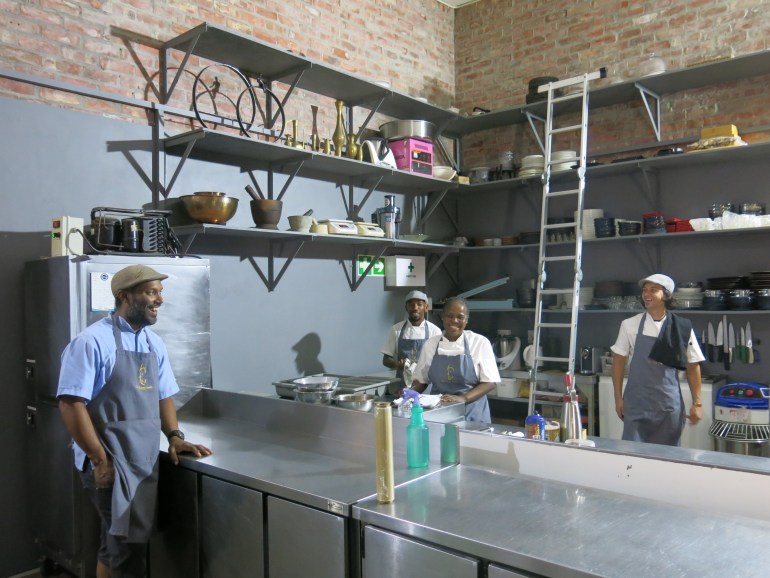
‘I love change and I don’t like politics’
Abdullatief found working as a hotel chef tiresome, so he applied for a job at a tourist restaurant in Cape Town’s trendy Waterfront precinct. He aced the required cook-off, and despite being a relative beginner, was soon in charge of all the restaurant’s biggest sellers.
“They specialised in the food I’d grown up with… Stews and bredies [vegetable broth stews] and curries. The bosses said my flavours were spot on. I never follow recipes or use measurements… It’s not something you can be taught. You smell the spice and you know how much you need.”
Abdullatief is the first to admit that he is easily bored: “I love change and I don’t like politics. Once the skindering [gossiping] starts, I’m outta there.”
After that first restaurant job, he landed a gig at a nearby boutique hotel. “It wasn’t fine dining”, he says, “but the head chef was often away and I learned a lot about managing a kitchen”.
His next big break came when he landed a junior job at Delaire-Graaff, one of many fine dining restaurants in the picturesque Cape Winelands region of South Africa’s Western Cape province. Working on a wine farm might seem a curious choice for a Muslim, but the establishment was at the epicentre of the South African culinary scene at the time, making it a good place to advance his career.
Esau, who met Abdualltief at Delaire-Graff, picks up the tale: “Anwar was working on the veg section, the busiest section of all, and we had three copper pans to feed 200 guests.” Esau was immediately impressed: “You could just see this guy, he’s got skills, he’s calm, he’s meticulous, he knows what he’s doing.”
Over the next 12 years, Abdullatief honed his craft at several prestigious restaurants around the Winelands, approximately an hour from Cape Town. Moving there meant leaving his beloved Cape Town – and its plentiful waves – behind. However, he also met a budding chef called Yolani Abrahams, who would become his wife.
He thought he would finally be able to settle in one place when he was made executive chef at a prestigious wine farm. “I established a vegetable garden for the kitchen and I was living in this beautiful cottage on the farm. The job was perfect.”
But the fairytale came crashing down when COVID-19 hit. “The boss agreed to pay my salary but he refused to pay my staff,” he tells Al Jazeera, anger flushing his face. “He wouldn’t even let me give them vegetables from the gardens or food from the pantry. These people had nothing. Really, nothing.”
Abdullatief ignored his boss’s orders, handing out food to those who needed it most, and lost his job.
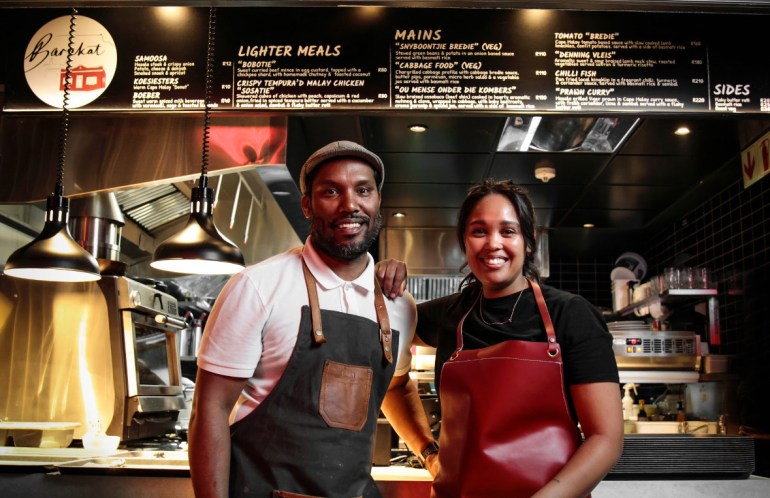
Becoming his own boss
Fed up with working for other people, Abdullatief teamed up with a family in the nearby town of Paarl to open My Cross Aunt. Its gourmet take on breakfast staples was an instant hit, he says, but he quickly realised that working with partners was just as fraught as working for bosses.
He then switched focus to private cheffing: “I was my own boss, no one was telling me what to do. I vowed never to go back to big restaurants and fine dining.”
Fate had other ideas. Soon, The Happy Uncles had established a reputation that opened new, and lucrative, doors for Abdullatief.
When Time Out opened its first market – there are only seven in the world – on the African continent, they reached out to Abdullatief to become part of the exclusive franchise.
“Someone at Time Out’s head office in London had heard about The Happy Uncles,” he explains. “They could have asked an aunty from the Bo Kaap [a traditional Cape Malay hood] but they wanted something more refined. Something between fine dining and a massive plate of curry.”
In November 2023, Abdullatief opened Barakat – which means “blessings” in Arabic – in the Time Out Market at the V&A Waterfront area of Cape Town. (When Al Jazeera visited the stall, it had the longest line of all the vendors).
The all-halal menu features dishes that originated in the slave-run kitchens of 17th century Cape homesteads: Denningvleis, which is lamb neck in a sticky, black tamarind sauce unique to Cape Town, and ou mense onder die komberse (“old people under the blankets”), a slow-braised beef shin wrapped in cabbage leaves.
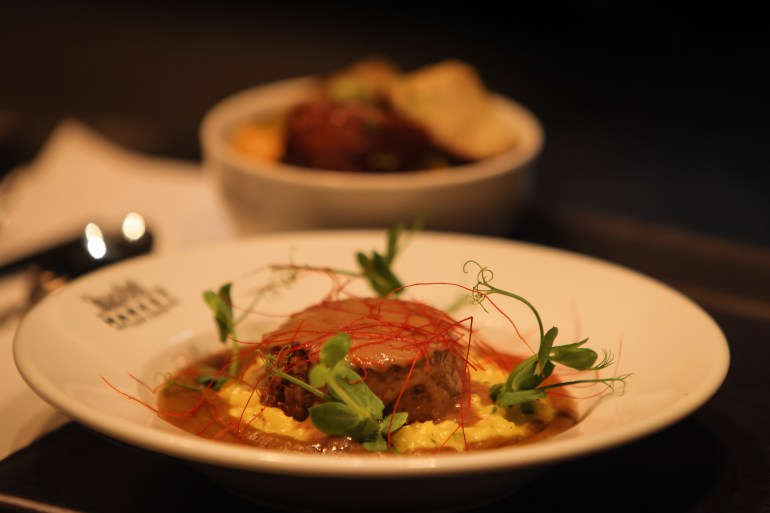
“Every single dish at Barakat connects me to my childhood,” he says. “At the Happy Uncles, there’s always a whole lot of elements that connect me to my past. But they’re mixed in with my present and my future.”
Case in point: the dessert course on the menu the day Al Jazeera visited The Happy Uncles. The Malva Tart, named after South Africa’s most famous pudding, is an ambitious and visually arresting exploration of some of Cape Town’s most iconic sweet flavours.
“We make a malva pudding and we blend the whole thing and put it into a long, rectangular tart case,” Abdullatief explains. This is accompanied by a delicate arrangement of mebos (South African dried fruit) jelly, koesister crumble (a delicately spiced Cape Malay take on doughnuts) and boeber (a milky drink made from vermicelli and sago, and flavoured with cardamom, stick cinnamon and rose water) ice cream.
Never one to stand still, Abdullatief says he is currently busy with several projects, noting that there are “definitely more Cape Malay projects in the pipeline”. He and Abrahams are researching dishes from as far back as the 1600s, finding ways to preserve the cuisine “as well as keeping it relevant”.
“It’s reached a point where I feel responsible for the cuisine and my culture,” he says. “We have to preserve it… It is fading. There are so many dishes that are so good. Hundreds and hundreds of dishes that people don’t cook any more. Keeping these dishes alive is very important.”
















